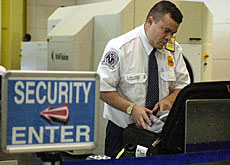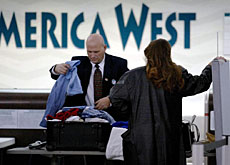September 11 and Switzerland

For American-Swiss relations, there is a "before" and an "after" September 11.
The security measures taken by Washington in the wake of the terrorist attacks two years ago have had far reaching consequences.
The attacks did not just upset the world’s political stability, they had a major effect on the global economy.
The aviation industry was the first to suffer. Switzerland’s national carrier, Swissair, which was already in financial difficulty at the time of the attacks, was a major casualty.
Jean-Claude Donzel, currently spokesman for the national airline, Swiss, and former spokesman for Swissair, remembers the crisis.
“It was an enormous shock. People simply stopped travelling.”
“And the security measures taken afterwards by the United States have had a huge impact too,” he added. “They are costing billions of dollars.”
America in armour
Immediately after the attacks of September 11, the US decided on a raft of stringent security measures.
The US congress voted in the ‘Patriot Act’, which gives the government almost unlimited powers to hunt down suspected terrorists and seize their assets.
As one of the world’s major financial centres, Switzerland naturally found itself in the spotlight.
Washington has been pressuring other countries to hand over information about the movement of funds or the opening of bank accounts by foreigners.
Switzerland’s banking secrecy is already under pressure from the European Union, now America’s security measures are affecting it too.
A particular concern is the US’s apparent unwillingness to differentiate between terrorist money, dirty money, or the proceeds of tax evasion.
Close collaboration
However, on the police level, there is close collaboration between Switzerland and the United States.
The Swiss justice minister, Ruth Metzler, has met her American counterpart, John Ashcroft, three times since the attacks.
In September 2002 Switzerland’s chief prosecutor Valentin Roschacher signed a working agreement with the US administration.
Since then, on both sides of the Atlantic, Swiss and US police have been working side by side.
Switzerland recently tightened its telecommunications rules, after it emerged that Al Quaida members had been using mobile telephones with pre-paid, anonymous, cards.
These were easily obtained in Switzerland until March 2003, when parliament decided to outlaw them.
Meanwhile, in a further step towards close collaboration, the US House of Representatives has set up a committee aimed at strengthening US – Swiss dialogue, in particular in the field of combating terrorism.
Complex framework
In Bern, the US chargé d’affaires Jack Zetkulic stressed that Switzerland had become “a valuable partner in the hunt for terrorist funds and in the fight against terrorists”.
“Our relationship is supported by a very complex framework,” he explained.
“We have been extremely impressed by the diligence and efficiency with which the Swiss have frozen suspects’ assets,” he added.
Up to now, Switzerland has frozen 82 bank accounts containing a total of $34 million.
Spying on travellers
But the aftermath of September 11 has also had consequences for ordinary people.
According to American investigators, many suspected terrorists had out of date visas. The US therefore decided to strengthen its border controls.
And, from October 1, 2003, those permitted to enter America without a visa would be required to have a passport with bar codes.
However, this requirement may be delayed for a year, under certain unspecified conditions.
Furthermore, Washington has demanded the right to see the personal details of all passengers arriving in the US by air.
For aviation companies like Swiss, this poses problems, since the company is also bound by Switzerland’s data protection laws.
Many Swiss citizens are unhappy with what some have called the ‘draconian’ security measures. “Since September 11, everything’s changed for the worse,” said one Geneva businessman, who preferred to remain anonymous.
But things are not likely to improve in a hurry. From January 2004 US border police will have the right to take photographs and finger prints of all those arriving in the country.
One result can be seen already; the number of Swiss travelling to the US fell by 20 per cent in 2002. Walter Diggelmann, president of the Swiss American Chamber of Commerce, admits that the stricter conditions of entry have not been welcomed.
“Large sections of the population don’t really understand why they are there,” he said.
Switzerland, in return, has also seen a 20 per cent drop in visitors from the US. The main reason for that however is the economic downturn, the weakness of the dollar, and nervousness about travelling.
Consequences for business
The US is paying close attention to foreign business too. Merchandise heading for America is now subject to careful scrutiny.
Under the terms of the ‘Custom-trade partnership against terrorism’, companies exporting goods to the US are required to apply US standards of security, and supply information to the US authorities.
But the volume of trade between the US and Switzerland has not really changed since September 11. After the European Union, the US remains Switzerland’s second biggest market.
swissinfo, Isabelle Eichenberger
Swiss visitors to the US dropped by 20 per cent in 2002.
At the same time, overnight stays in Switzerland by Americans also dropped by 20 per cent.
Swiss applications for emigration to the US dropped by 5% – applications to the EU rose by the same amount.
The US is Switzerland’s second biggest export market after the EU. 700 Swiss companies employ a total of 550,000 people in the US.

In compliance with the JTI standards
More: SWI swissinfo.ch certified by the Journalism Trust Initiative


You can find an overview of ongoing debates with our journalists here . Please join us!
If you want to start a conversation about a topic raised in this article or want to report factual errors, email us at english@swissinfo.ch.